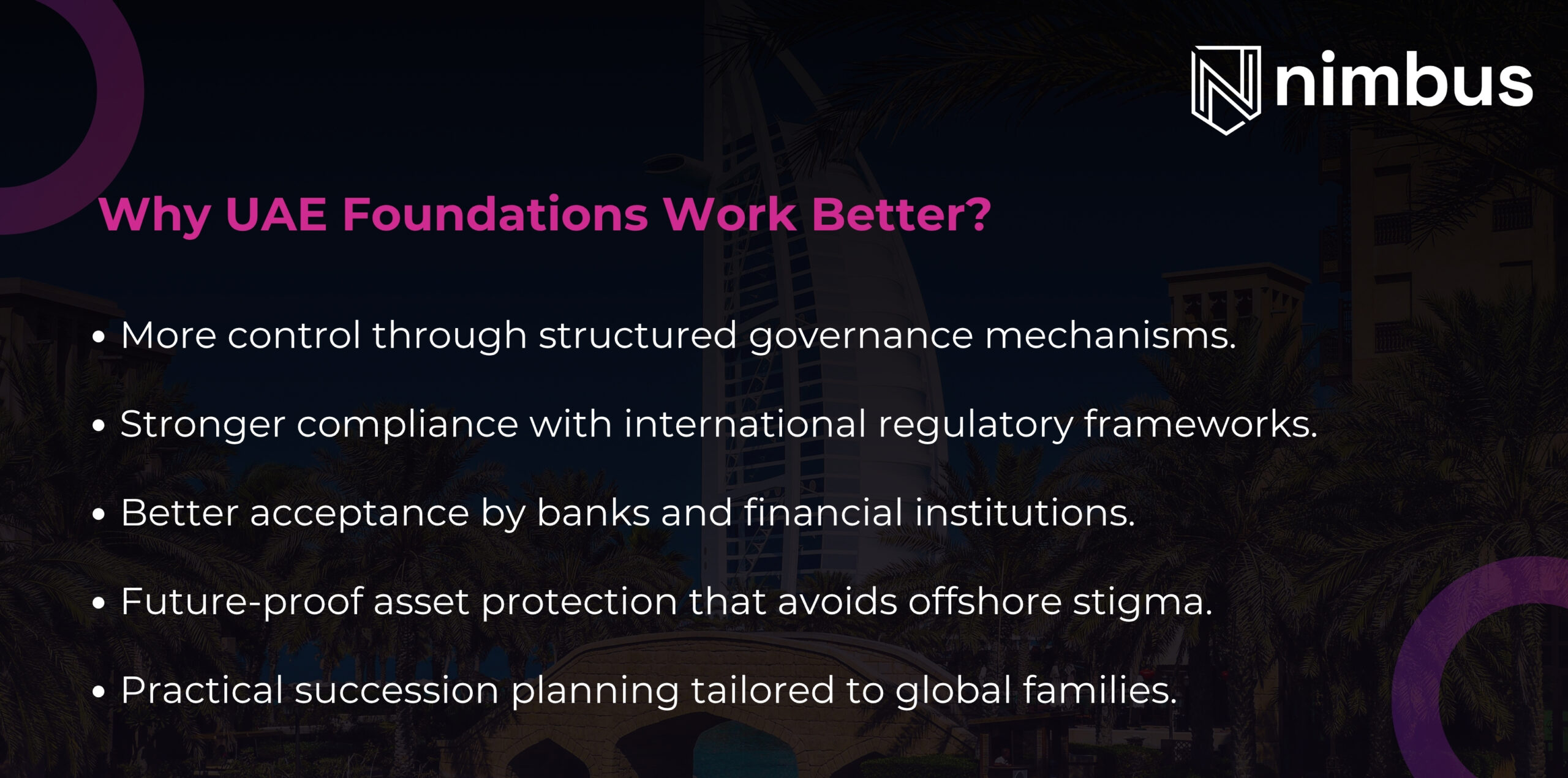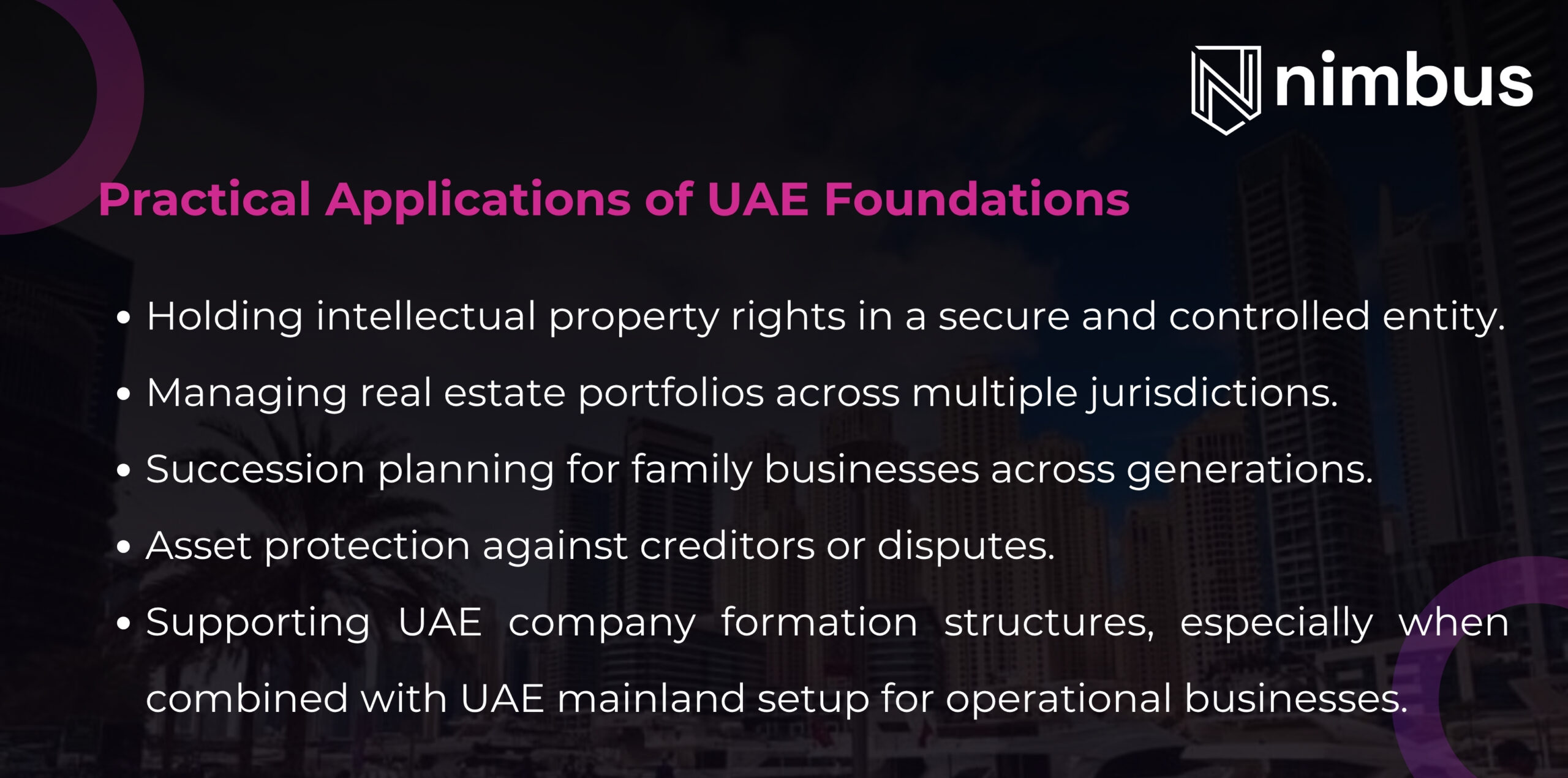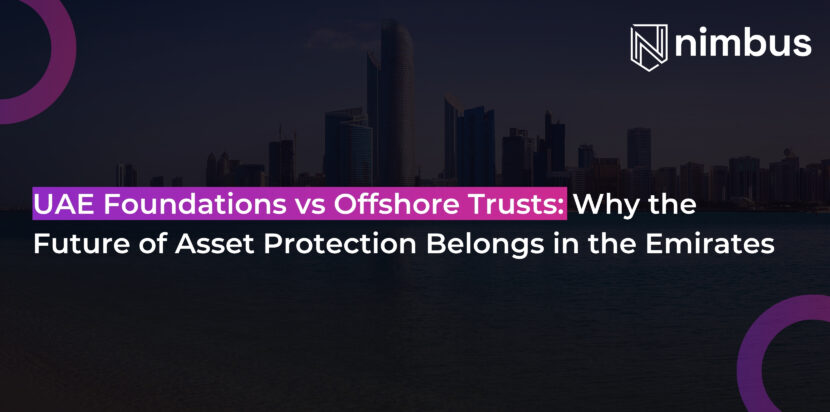The scenario of asset protection has changed dramatically in the past decade. What used to be considered gold-standard vehicles for wealth protection, such as offshore trusts in jurisdictions like Cayman Islands, are now increasingly seen as high-risk and impractical.
Regulatory blacklists, banking de-risking, and transparency requirements under the Common Reporting Standard (CRS) and FATCA have undermined confidence in these once-popular offshore solutions.
For investors, entrepreneurs, and high-net-worth individuals (HNWIs), secrecy-driven offshore structures no longer provide the security or flexibility they once promised.
Instead, a new structure has emerged in the UAE that provides asset protection without the compliance headaches, Foundations established in the Dubai International Financial Centre (DIFC) and Abu Dhabi Global Market (ADGM).
For those exploring business setup in the UAE, the UAE Foundation model represents a future-proof way to manage assets, safeguard wealth, and plan succession while maintaining transparency and control.
The Problem with Offshore Trusts
Offshore trusts once thrived in an environment where secrecy was seen as an advantage. But the same secrecy that attracted global wealth holders has now become a liability. Offshore jurisdictions face constant regulatory challenges and scrutiny. Key issues with offshore trusts include:
- Public disclosure of ultimate beneficial owners (UBOs) under CRS/FATCA.
- Reduced founder control, as legal authority lies with the trustee.
- Growing banking restrictions and de-risking policies.
- Increased reputational risk due to association with secrecy-driven jurisdictions.
In short, offshore trusts are losing credibility in the eyes of regulators, banks, and even clients who now seek compliant, transparent solutions that do not compromise on privacy or control.
Enter UAE Foundations
Foundations in the UAE offer a modern, legally robust alternative. Established under DIFC and ADGM frameworks, they are designed to meet international compliance standards while giving founders privacy, control, and long-term protection.
Unlike offshore trusts, they are fully aligned with the UAE’s positioning as a transparent, globally integrated financial hub. Foundations are particularly attractive for those already considering UAE business setup.
They can be integrated into broader corporate structures and complement UAE company formation strategies, ensuring asset protection is part of a sustainable and compliant business model.
Comparing UAE Foundations and Offshore Trusts
Let’s examine how the two structures differ across five critical areas.
1. Privacy and Disclosure
- Offshore Trusts: CRS and FATCA require disclosure of UBOs to tax authorities, making offshore trusts less private than they appear.
- UAE Foundations: No public UBO registry. Founder details remain confidential. Internal charters are private and not publicly accessible. Privacy exists within the bounds of law, not secrecy.
2. Control and Ownership
- Offshore Trusts: Legal ownership rests with trustees, which means founders lose direct control. While protective in theory, this often results in limited flexibility.
- UAE Foundations: Founders can structure control through the foundation’s charter, board, or council. They can appoint protectors or advisors while separating legal ownership from functional authority. This balance preserves protection while ensuring strategic oversight.
3. Compliance and Regulation
- Offshore Trusts: Increasingly non-compliant with international standards. Many jurisdictions face FATF grey-listing or blacklisting. Structures often attract suspicion from regulators and financial institutions.
- UAE Foundations: Fully aligned with UAE’s compliance environment. DIFC and ADGM are internationally respected and FATF-aligned, ensuring acceptance by global financial systems.
4. Bankability
- Offshore Trusts: Banks across the GCC and beyond are tightening their stance, often rejecting accounts linked to offshore trusts due to compliance risks.
- UAE Foundations: Trusted by UAE and regional banks. Viewed as transparent, structured, and compliant. This makes foundations far more practical for holding assets, investments, and bankable wealth.
5. Succession Planning
- Offshore Trusts: Dependent on trustees, often unpredictable in execution. Disputes and inconsistencies are common.
- UAE Foundations: Provide clear, legally recognized succession planning mechanisms. Founders can also opt out of Sharia succession laws if desired, offering flexibility for international families.
Why UAE Foundations Work Better?
The shift from secrecy to transparency is undeniable. Today’s investors want legally compliant confidentiality, not risky concealment. UAE Foundations deliver this by offering:

- More control through structured governance mechanisms.
- Stronger compliance with international regulatory frameworks.
- Better acceptance by banks and financial institutions.
- Future-proof asset protection that avoids offshore stigma.
- Practical succession planning tailored to global families.
These benefits make Foundations a superior solution for long-term wealth management and protection.
Practical Applications of UAE Foundations
UAE Foundations are versatile and can be used for:

- Holding intellectual property rights in a secure and controlled entity.
- Managing real estate portfolios across multiple jurisdictions.
- Succession planning for family businesses across generations.
- Asset protection against creditors or disputes.
- Supporting UAE company formation structures, especially when combined with UAE mainland setup for operational businesses.
The Role of Business Setup Services
For entrepreneurs and HNWIs considering UAE business setup, incorporating a foundation can be part of a long-term strategy. Business setup services in the UAE now go beyond just licensing and registration. They must also include advisory on governance, asset protection, and succession.
Professional advisors can help in the following ways:
- Assess existing offshore structures and their risks.
- Transition assets into UAE Foundations smoothly.
- Draft foundation charters that reflect founder intentions.
- Integrate foundations into corporate and tax structures.
- Ensure alignment with compliance and reporting frameworks.
This is particularly important for those relocating operations to the UAE. Structuring correctly from the start avoids costly restructuring later.
Building for the Future
The global shift toward transparency has left offshore trusts exposed and increasingly impractical. UAE Foundations, however, are designed for the future. They combine privacy with compliance, control with separation of ownership, and flexibility with legal certainty.
For investors, families, and entrepreneurs, Foundations in the UAE offer a compliant, trusted, and bankable alternative that meets today’s demands for privacy, protection, and governance.
By embracing structures built on transparency and regulatory strength, businesses and families can protect wealth for generations while maintaining the flexibility needed in a changing global economy.



